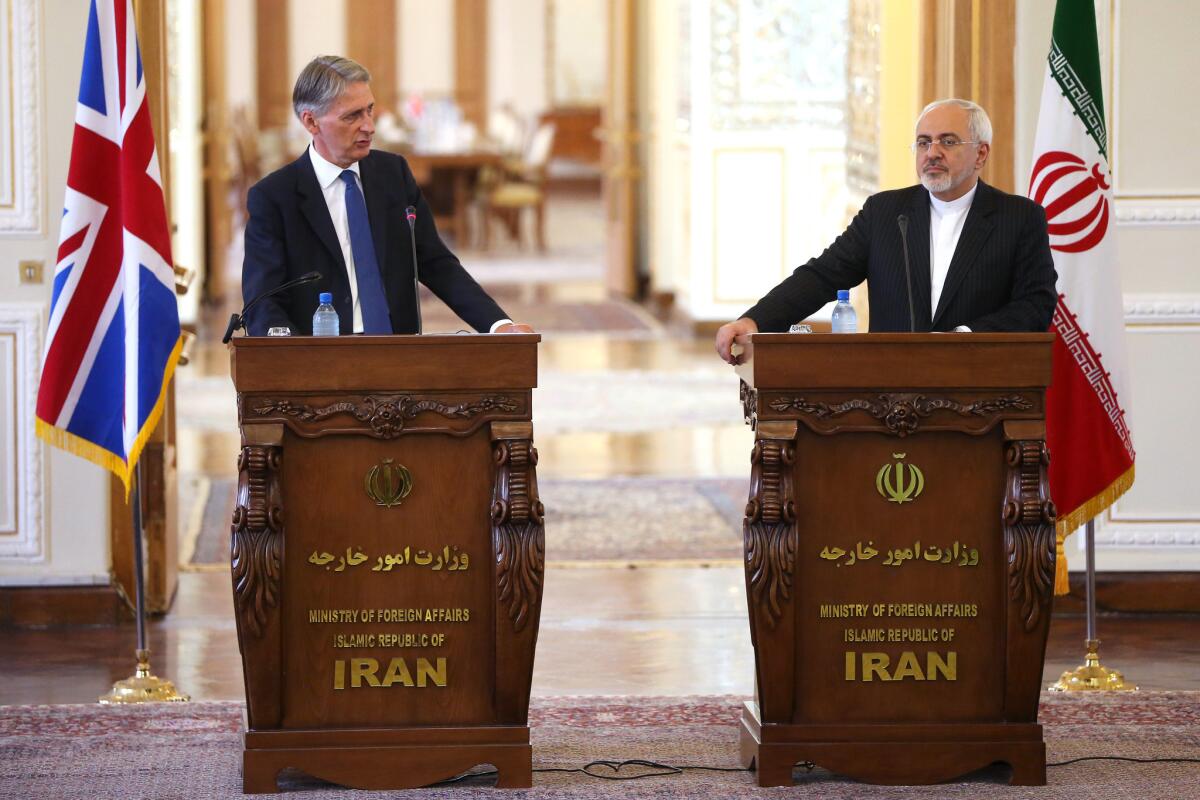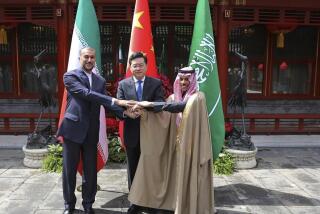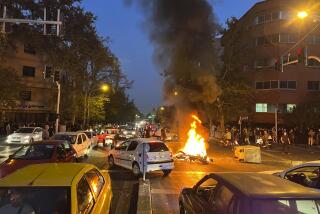Union Jack flies in Tehran as Britain reopens Iran embassy

British Foreign Secretary Philip Hammond, left, at a press conference with Iranian Foreign Minister Mohammad Javad Zarif in Tehran on Sunday.
- Share via
Reporting from Tehran — With police sealing off the site for safety, Britain on Sunday reopened its embassy in the Iranian capital, raising the Union Jack for the first time since the landmark diplomatic compound was stormed in 2011 by Iranian hardliners.
The reestablishment of a British diplomatic presence in Tehran – and the reopening hours later of Iran’s mission in London – marked another milestone in the Islamic republic’s cautiously improving ties with the West.
Last month, Iran and six Western powers, including the United States, reached a historic accord calling for long-term curbs on Iran’s nuclear program, although the pact still needs congressional approval. The agreement is expected to lead to the lifting of international sanctions that for years have left Iran economically isolated.
The November 2011 attack on Britain’s two main diplomatic compounds in Tehran were reminiscent of the 1979 takeover of the U.S. Embassy, which set off a 444-day hostage crisis. Washington and Tehran still have not resumed diplomatic relations.
British Foreign Secretary Philip Hammond, on the first visit to the Iranian capital by a British foreign secretary since 2003, said the storming of the United Kingdom’s two main diplomatic compounds in Tehran had marked a “low point” in relations. In the wake of the attack, Britain closed its Tehran embassy and ejected Iranian diplomats in London.
But the 2013 election of reformist-minded Iranian President Hassan Rouhani inaugurated a gradual thaw. Last fall, Rouhani and British Prime Minister David Cameron met in New York, the two countries’ first tete-a-tete at such a high level since 1979.
Hammond called the reopening of both missions “the logical next step to build confidence and trust between two great nations.” Full ambassadors are expected to be appointed in coming months; in the meantime, both governments will be represented at the charge d’affaires level.
In remarks at the ceremony and a later joint news conference with his Iranian counterpart Javad Zarif, Hammond said disagreements were inevitable but that London and Tehran could deepen cooperation on such important regional issues as battling drug trafficking, terrorism and the growing power of the Islamic State militant group.
“As confidence and trust grows, there should be no limit to what, over time, we can achieve together, and no limit to our ability to discuss these issues together,” Hammond said.
Zarif, for his part, said Iran sought “mutual gains for all countries in the region” and called extremism and terrorism common problems to be jointly confronted.
Despite a determinedly conciliatory atmosphere, there were lingering reminders of the rupture between the two countries. Persian-language graffiti reading “Death to England” still marked the elegant compound. One hardline news outlet described the embassy reopening as the “return of the fox” – an epithet used in past years to refer to perceived British perfidy.
Three busloads of protesters arrived in an apparently orchestrated show of anger over the restoration of diplomatic ties, but were kept blocks away, with a few detained and the rest dispersed.
Many Iranians, however, welcomed what they hope will be an end to years of economic hardship resulting from the sanctions. Hammond was accompanied by a group of business leaders from several large multinational firms, most from the energy sector.
Hassan Mosavi, a 57-year-old barber with a shop near the embassy, saw its reopening as a good omen for Iran.
“We should forget the past and look forward to a better future,” he said.
Special correspondent Mostaghim reported from Tehran and Times staff writer King from Cairo. Staff writer Henry Chu in London contributed to this report.
More to Read
Sign up for Essential California
The most important California stories and recommendations in your inbox every morning.
You may occasionally receive promotional content from the Los Angeles Times.













